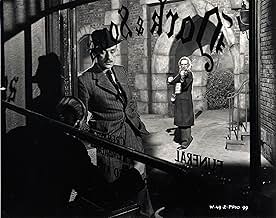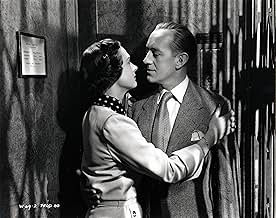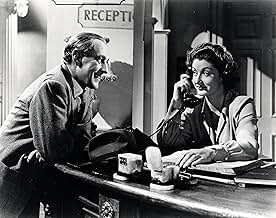VALUTAZIONE IMDb
7,3/10
2283
LA TUA VALUTAZIONE
Aggiungi una trama nella tua linguaWhen a lonely, unappreciated farm-equipment salesman discovers he has only a few weeks to live, he withdraws his savings for a final holiday at a "posh" resort.When a lonely, unappreciated farm-equipment salesman discovers he has only a few weeks to live, he withdraws his savings for a final holiday at a "posh" resort.When a lonely, unappreciated farm-equipment salesman discovers he has only a few weeks to live, he withdraws his savings for a final holiday at a "posh" resort.
- Regia
- Sceneggiatura
- Star
Grégoire Aslan
- Gambini
- (as Coco Aslan)
Eveline Kirkwood-Hackett
- Miss Hatfield
- (as Mme. Kirkwood-Hackett)
Recensioni in evidenza
I love this film and it's one of the few I've watched time and time again. It's a forgotten jewel and is infrequently mentioned. For me it has everything that was important of it's era. The social comment is mingled into an entertaining story. How the Health Service is expanding but people go hungry. An over worked Doctor making mistakes. George Bird being projected into a world that is not his own. The irony of riches coming his way when he thinks he has little time left. The Union's getting their grip on the country with strike action. How the upper classes view the lower and vice versa. How George Bird is now viewed as upper class because of his new setting. Post war money laundering. How war heroes can't find work. Love and jealousy. And the ironies - how he buys a dead man's clothes. How he swerves a car to avoid a dog that is due to be destroyed and turns into a road called 'Fallow End.' Then there is the acting. Sid James gives one of his great performance. His 1940's and 1950's work was superb. Sadly remembered for his Carry On performances more than the superb actor that he was. He just holds the scenes and in some cases is competing well with Guinness. For Guinness this is an early film. Ernest Thiesiger makes a great appearance along with many others including the delightful Kay Walsh. Esma Cannon's acting is well done - better than her later performances where 'silly' scripts let her down.
Please do see it if you can. It's a little gem.
Please do see it if you can. It's a little gem.
A small-town salesman, George Bird, learns that he is suffering from an incurable condition, leaving him only weeks to live. With no family or friends to care for, he decides to spend his modest savings on his first and last stay in a grand hotel.
The other guests soon notice that he is new to hotel life, and react to him in different ways - some disdainful, some intrigued and friendly. These guests reflect the old English class-system, with its myriad of sub-classes, starting to die out by 1950, largely because of the left-wing postwar government that had been so championed by J.B. Priestley, author of this screenplay.
Before long, Bird's life seems to be opening out, with job-offers, investment opportunities, even a chance of love. A bitter irony of course, as these opportunities will never be enjoyed (or so we are to assume).
The comfortable hotel life gets a jolt when the staff are suddenly called-out on strike, instantly shaking-up the class-system, as all the guests have now got to try to pitch-in and help, as best they can. This provides for a number of accidental meetings that move the plot forward dramatically. And the effect on Bird's humdrum life, suddenly turned roller-coaster, is dramatic indeed.
Interesting to see the yet-undiscovered Sid James as a dodgy gambler, and David McCallum's father (also David) on the violin, beginning and ending the story with a simple but curiously haunting theme.
For a film that has given so much pleasure - check the other IMDb reviews - it may seem spoilsport to suggest that Alec Guinness does not quite carry conviction as such a small and narrow character as Bird. This is someone who just earns his daily pittance and then goes home to read the paper and smoke his pipe. For this role, Guinness simply looks and sounds too cultivated, too sociable, altogether too biddable. (Ironically there was a character actor called Norman Bird, who would have been perfect!)
The other guests soon notice that he is new to hotel life, and react to him in different ways - some disdainful, some intrigued and friendly. These guests reflect the old English class-system, with its myriad of sub-classes, starting to die out by 1950, largely because of the left-wing postwar government that had been so championed by J.B. Priestley, author of this screenplay.
Before long, Bird's life seems to be opening out, with job-offers, investment opportunities, even a chance of love. A bitter irony of course, as these opportunities will never be enjoyed (or so we are to assume).
The comfortable hotel life gets a jolt when the staff are suddenly called-out on strike, instantly shaking-up the class-system, as all the guests have now got to try to pitch-in and help, as best they can. This provides for a number of accidental meetings that move the plot forward dramatically. And the effect on Bird's humdrum life, suddenly turned roller-coaster, is dramatic indeed.
Interesting to see the yet-undiscovered Sid James as a dodgy gambler, and David McCallum's father (also David) on the violin, beginning and ending the story with a simple but curiously haunting theme.
For a film that has given so much pleasure - check the other IMDb reviews - it may seem spoilsport to suggest that Alec Guinness does not quite carry conviction as such a small and narrow character as Bird. This is someone who just earns his daily pittance and then goes home to read the paper and smoke his pipe. For this role, Guinness simply looks and sounds too cultivated, too sociable, altogether too biddable. (Ironically there was a character actor called Norman Bird, who would have been perfect!)
The central character (Guiness) is "a modest unassuming salesman of agricultural implements" (Wikipedia). A respectable almost classless person whose unassuming manner, unglamorous job and modest salary have limited his social circle. For the first (and last) time circumstances allow him to spend freely and, for want of any other idea, stay a few weeks at a very upmarket seaside hotel. Its clientele have only one thing in common: either possessing wealth or using the opportunity to accumulate it. Some are rich and lack class, others have power and status as well as wealth. The Guinness character for the first time has an opportunity to network with important people.
Guinness in a way reprises his role in The Man in the White Suit - a thoroughly honest man innocent in the ways of the world whose modest manner and appearance belies his inventive genius. Yet is remarkably unchanged by success and continues to treat both high and low equally - and cause a surprising degree of unintended upset.
A good story with excellent cast, it is a less demanding part for the chameleon genius of Guinness. As usual with Priestley very well crafted story-telling. However the film dates from 1950 - 5 years after WW2 when people were looking to a better future and trying to put grief behind them. During WW2, Priestley had been the nation's uncle, providing not false comfort but a steadying presence putting the worlds events into a assimilable form for the average person. With the end of the war, the public's need for Priestley (much as their need for Churchill) ended. The film's sour end seems to have no point other than to say just when things are looking up and people at their most cheerful and optimistic, everything can be be dashed to the ground in an instant.
Guinness in a way reprises his role in The Man in the White Suit - a thoroughly honest man innocent in the ways of the world whose modest manner and appearance belies his inventive genius. Yet is remarkably unchanged by success and continues to treat both high and low equally - and cause a surprising degree of unintended upset.
A good story with excellent cast, it is a less demanding part for the chameleon genius of Guinness. As usual with Priestley very well crafted story-telling. However the film dates from 1950 - 5 years after WW2 when people were looking to a better future and trying to put grief behind them. During WW2, Priestley had been the nation's uncle, providing not false comfort but a steadying presence putting the worlds events into a assimilable form for the average person. With the end of the war, the public's need for Priestley (much as their need for Churchill) ended. The film's sour end seems to have no point other than to say just when things are looking up and people at their most cheerful and optimistic, everything can be be dashed to the ground in an instant.
Absent for years in Europe on both TV and Video, I finally managed to acquire this one on a VHS tape from the US. A man learns he has a short time to live and decides to make the most of it by living it up in a luxury hotel. His life suddenly becomes far more interesting, makes more money than ever before and luck generally smiles him in the face. I remember seeing it about Thirty years ago and wondered how a new viewing would affect me. There were one or two disappointments, I had a memory of the film being rather more romantic than it actually is ( nothing much actually happens on this side ) and parts of the film are rather 'chatty'. This said the overall story is quite original. The film captures that now long-lost atmosphere of a luxury 1950's English hotel in the bright sunshine presumably situated in Devon or Cornwall (as we see palm trees in the garden. There are many well-known actors and the script is quite original to say the least. Another of J.B. Priestley's stories 'An Inspector Calls' was also made on film and is actually very good, even better than 'Last Holiday'. Nevertheless, the haunting theme music (solo fiddle) and thedécors are A1. Picture and sound quality are very good for the time (1950) and I am surprised that the film is not readily available on VHS and DVD everywhere! Of course, Alec Guinness was a great actor and his performance here is totally up to standard. If the romantic side of it all had been pushed just a little further the film would have been perfect for me ! The ending of the film is the Wickedest and most unexpected in the history of cinema !
10albee-2
A poignant, bitter-sweet comedy that drives home its points in clever, subtle ways. Surprisingly, for a film 50 years old, the acting, direction and story line keep it fresh and timely. Alec Guiness "made his bones" in excellent early films such as this and gave us a sneak preview of the greatness that was to come.
Lo sapevi?
- QuizThe film includes cast members who cropped up in various Alec Guinness films. Amongst them are Sidney James, Ernest Thesiger and Kay Walsh.
- BlooperBird states that he made about 9 Pounds a week. This is about 470 Pounds per annum. When his manager is trying to get him to stay he first offers to raise his salary to 400 Pounds p.a.
- Citazioni
George Bird: How do you keep smiling with a stiff upper lip?
- ConnessioniRemade as L'ultima vacanza (2006)
I più visti
Accedi per valutare e creare un elenco di titoli salvati per ottenere consigli personalizzati
- How long is Last Holiday?Powered by Alexa
Dettagli
- Data di uscita
- Paese di origine
- Lingua
- Celebre anche come
- Ferien wie noch nie
- Luoghi delle riprese
- Luton, Bedfordshire, Inghilterra, Regno Unito(Shopping parade and Doctor's office)
- Azienda produttrice
- Vedi altri crediti dell’azienda su IMDbPro
- Tempo di esecuzione1 ora 28 minuti
- Colore
- Proporzioni
- 1.33 : 1
Contribuisci a questa pagina
Suggerisci una modifica o aggiungi i contenuti mancanti































